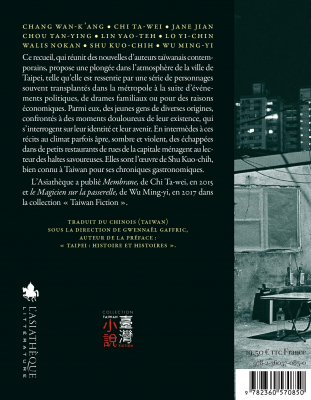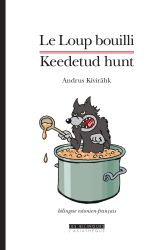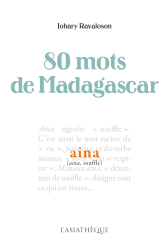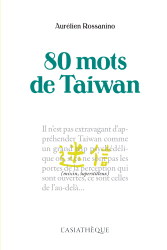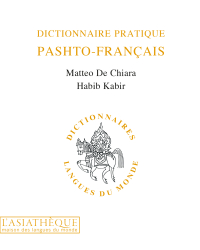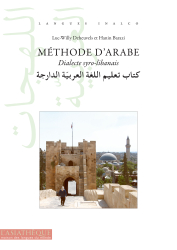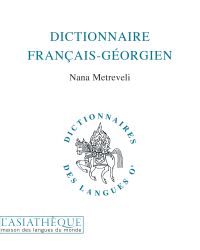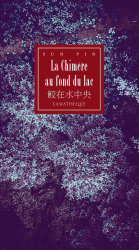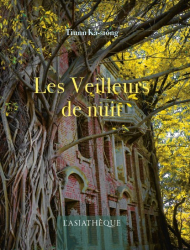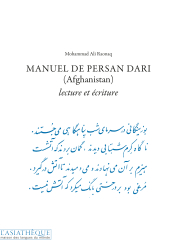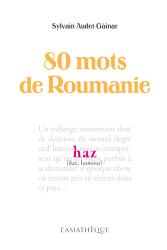Details
Format: Paperback
ISBN: 9782360570850
Collection: Taiwan Fiction
14 x 18 cm
Weight: 260 gr
Pages: 240
First publication: 03/05/2017
Last printing: 02-2023
Taipei
Histoires au coin de la rue
(Stories around the corner)
Translation: Lise Pouchelon, Marie-Paule Chamayou, Marie Laureillard, Chingjin Wu-Soldani, Mélie Chen, Coraline Jortay, Gwennaël Gaffric, Olivier Bialais, Damien Ligot
Preface : Gwennaël Gaffric
Urban short stories from the Taiwanese capital
This book which combines short stories from Taiwanese contemporary authors, proposes a dive in the atmosphere of the city of Taipei, such as it is felt by a series of characters often transplanted in the metropolis after political events, family dramas or for economic reasons. Among them, young people of diverse origins, confronted to painful moments of their existence, which wonder about their identity and their future. In interludes to these narratives sometimes bitter, dark and violent, breakaways in small restaurants in streets of the capital give the reader some tasty halts. They are the works of Shu Kuo-chih, well known in Taiwan for its gastronomic chronicles. L'Asiathèque published Membrane, by Chi Ta-wei, in 2015 et Le Magicien sur la passerelle, by Wu Ming-yi, in 2017 in the collection "Taiwan Fiction". Translated from chinese (Taiwan) under the direction of Gwennaël Gaffric, author of the preface : "Taipei, story and stories". By Jane Jian - Lin Yao-teh - Walis Nokan - Lo Yi-chin - Wu Ming-yi - Chi Ta-wei - Chang Wan-k'ang - Chou Tan-ying - Shu Kuo-chih. Short stories and chronicles translated by Olivier Bialais, Marie-Paule Chamayou, Mélie Chen, Gwennaël Gaffric, Coraline Jortay, Marie Laureillard, Damien Ligot, Lise Pouchelon et Chingjin Wu-Soldani
PRESS REVIEW
« ... Dans ce recueil de nouvelles, les voix des auteurs majeurs de la littérature taiwanaise contemporaine se succèdent pour raconter la ville de Taipei, ses couleurs, ses saveurs, ses habitants ... »
« ... Écrivain-voyageur, il a beaucoup écrit sur ses voyages en différentes régions du monde, mais aussi sur les singularités régionales de son île natale, dont trois recueils de sanwen rien que sur la ville de Taipei ... »
« ... Taipei la provinciale est devenue la capitale de Taiwan à marche forcée. (...) et sert de décor à une anthologie de nouvelles écrites dans la décennie 2000 - 2010 ... »
Taipei, histoires au coin de la rue
“... The Asiathèque invites us to discover this very special city through eight short stories with various themes as well as seven culinary chronicles. A daring choice to help visitors discover this cosmopolitan, complex, cold and sometimes violent city ... "
Taipei, histoires au coin de la rue
“... This anthology offers several short stories from different contemporary Taiwanese authors, each time with the backdrop of the city of Taipei, cosmopolitan, earthy, but also cold and violent. This news reflects the reality of the contemporary world as well as the complexity of Taiwanese society, with its different ethnic and linguistic groups, its communities and its marginalized ... "
Taipei Heartbeats
"... Resolutely modern voices to express the pulsations of the megalopolis and its actors often in perdition in the moving tide of urban activity ..."
Free China in Taipei
"... This collection of short stories offers a multiple and original vision of the capital, through the eyes of major authors of the contemporary Taiwanese literary scene ..."
Translated books don't die
"... This anthology offers a multiple and original vision of the city of Taipei, through the eyes of major authors of the contemporary Taiwanese literary scene ..."
Telling a story is like conjuring
"... In "Histoire de toilettes" Wu Ming-yi chooses to take the reader to the public toilets of the old market of Chunghwa to evoke crudely from a series of scenes of life the harshness and the mysteries of urban society ... "
Beginning of June on Taiwan time!
"... An anthology, Taipei, histoires au coin de la rue of the street makes us discover this character of novel which is the Taiwanese capital, and three writers who contributed to this collection: Chou Tan-ying, born in 1979, who lives today in France and evokes in a subtle counterpoint the atmosphere of Taipei and that of Paris ... "
Stories around the corner: diving into today's (and yesterday's)Taipei city
"... The texts are preceded by a superb preface by Gwennaël Gaffric who places the texts in a historical, topological and cultural context by giving a brief overview of the history of Taipei from the beginning of the 18th century, a description of the various districts of the city and a commented summary of the various texts, with a word on each of the authors ... "
Taipei, histoires au coin de la rue is a very interesting anthology of short stories that I'm so glad to have read!
“... Each story has its own universe although they all come together on the central theme of Taipei. I can only recommend this exotic and original reading. For my part, I am delighted to have been able to leave the beaten track of general literature with this collection ... "
[CRITICAL] "Tapei, histoires au coin de la rue": Captivating news
"... Whether you are a world traveler or a page surveyor, an avid reader or a curious skeptic, run and acquire this collection which is well worth the detours! ... "
Taipei, histoires au coin de la rue
"... All the news reflects the bad life of its inhabitants, its very often disillusioned youth, reveal the problems of racism and integration, the violence of relations, the incomprehension and the loneliness which results from it. But from all this is born the mad hope of remodeling this city in order to make its problems disappear ... "
Taipei, histoires au coin de la rue
"... The chosen writers do not spare us the difficulties but nevertheless magnify this fascinating city ..."
Discover Taipei by day and by night by turning the pages
“... We discover the fear of difference, here the non-belonging to a gender and the fear of AIDS which resurfaces. Very original also, a story of toilets where we are told about things of nature by presenting us the public toilets of the old market of Chungwa ... "
Release of "Taipei, stories around the corner"
"... Published with the assistance of the Taiwan Cultural Center in Paris, it offers a multiple and original vision of the city of Taipei, through the eyes of major authors of the contemporary Taiwanese literary scene ..."
Taipei, histoires au coin de la rue
“... I was charmed by the quality of the stories offered. Through eight short stories and seven culinary chronicles, the city of Taipei is presented to us, luminous and dark at the same time, with its transformations and its folklore, through the voice of its residents from all walks of life ... "
Taipei, histoires au coin de la rue
"... With the short stories that make up this collection alternate little literary and gourmet escapades in the restaurants and night markets of Taipei ..."
Taipei, histoires au coin de la rue
"... If like me you have not yet had the opportunity to discover Taipei, this little gem of reading written by authors from the contemporary Taiwanese scene will take you in an original way into a universe that will take you out of your daily life. ... "
Taipei, histoire au coin de la rue
"... The gigantism of this city will not be able to escape you, you will see how each actor must remain in his place on pain of leaving the game. It is also with a direct style that you will discover the harshness of life urban and the fragile place of minorities ... "
Taipei, histoires au coin de la rue
"... After a fascinating historical and cultural introduction that helps contextualize the stories and better understand their issues, eight short stories are presented to the reader ..."
CONTRIBUTORS' BIOGRAPHIES
Walis Nokan
Walis Nokan, born in 1961 in the village of Mihu, on the island of Taiwan, is a writer from the Atayal indigenous population group. He was a primary school teacher and leads many writing workshops. In the 1990s, his literary production increasingly affirmed its roots in Atayal culture. His creativity, both in his prose works and in his poems, has earned him numerous awards and distinctions. He is the author of one of the short stories of the Taipei, histoires au coin de la rue, published in 2017 by l'Asiathèque.
Lo Yi-chin

Lo Yi-chin, né en 1967 à Taipei, est un écrivain régulièrement récompensé par les prix littéraires. D’abord auteur de nouvelles à la fin des années 1980, il écrit depuis aussi des romans ainsi que des chroniques pour les journaux. Son roman L’Hôtel Xixia), paru en 2008 et couronné par le prix Hongloumeng en 2010, est généralement considéré comme le plus représentatif de son œuvre. Plus récemment, il a également publié des recueils de courts récits évoquant la vie de tous les jours sur un ton plus léger, comme Mes petits garçons.
Wu Ming-yi

Wu Ming-yi, born in 1971 in Taiwan, teaches at Dong Hwa National University. Known for his environmental commitments, he is the author of several literary works, among which collections of short stories and novels. Two of his novels have been published in French: The Sleep Navigation Lines (You Feng, 2013) and The Man with the Faceted Eyes (Stock, 2014). This latest novel received the award 2014 Island Book Fiction, awarded at the International Book Fair islander of Ouessant.
Chi Ta-Wei
Chi Ta-wei is a Doctor of Comparative Literature from the University of California (UCLA), he teaches literature at National Cheng Kung University (Taiwan). He is an important figure in advocacy movements homosexual in the Chinese world.
Chou Tan-ying

Tan-Ying Chou is a lecturer at Bordeaux Montaigne University. Her research interests focus on bilingual writer Eileen Chang. In 2016, she translated Exercices de style by Raymond Queneau into Chinese, and into French a short story by Long Yingzong, "Le petit bourg aux papayers".
Lise Pouchelon
Lise Pouchelon trained in Chinese and Japanese languages and literature at University Lyon III and University Aix-Marseille, enriching her understanding of these cultures during university stays in Japan and China. Her Master's thesis was devoted to the novel "L'Hôtel Xixia" by Taiwanese writer Lo Yi-chin, at the Institut de recherches asiatiques (IrAsia, Université d'Aix-Marseille), where she developed her expertise in the translation of modern and contemporary Chinese literature. Today, she works as a professional editor, drawing on her linguistic skills and experience in editorial communication.
Marie Laureillard

Marie Laureillard is a lecturer in Chinese studies authorized to supervise research at the Université Lumière-Lyon 2 and a member of the Institut d'Asie Orientale (IAO). She conducts research on the history of modern art and aesthetics of China and Taiwan, as well as Chinese-language poetry.
Mélie Chen

Editor since November 2019 at Éditions Stock, Mélie Chen has a dual career as an editor and translator - from Chinese. At the end of her studies at the Ecole normale supérieure de Lyon in 2016, she was received first in the aggregation of Chinese. At the same time, she began to move towards publishing at an early age.
Coraline Jortay

Coraline Jortay holds a doctorate in Chinese literature at the Université libre de Bruxelles, where she defended a thesis on gender representations and identity construction among Chinese-speaking authors of the twentieth century. Also a literary translator, she won the 2nd and 3rd prizes of the 2013 China International Translation Competition with the short stories “Up”, by Wang Xiangfu, and “The Letter”, by Liu Qingbang, published in the collection Tranchant de moon and other contemporary news from China (Ming Books, 2016). She has also translated Walis Nokan's collection Les paths des rêve et autres microfictions (L’Asiathèque, 2018).
Gwennaël Gaffric
Gwennaël Gaffric (born 1987) is a lecturer in Chinese studies at the Université Jean Moulin Lyon 3, where he teaches Chinese language and culture. He is the author of several articles in French, English and Chinese on Chinese-language literature (China, Hong Kong and Taiwan). His recent research focuses on contemporary science fiction in Chinese. He is also one of the leading translators from Chinese of general literature, science fiction, fantasy and the humanities (literary studies, philosophy). His translations include the best-selling volumes of Liu Cixin's Three-Body Problem trilogy. He regularly translates for L'Asiathèque, where he heads the "Taiwan Fiction" collection. He has also published at L'asiathèque: La littérature à l'ère de l'anthropocène (2019).
Olivier Bialais

Olivier Bialais holds a master's degree in Chinese literature from the National Institute of Oriental Languages and Civilization (Inalco). He has lived in Taiwan for over six years, two of which were spent as a research assistant in the Department of Literature and Philosophy at Academia Sinica. He then spent several years in South Korea, notably as a French teacher at the Korean Defense Language Institute. Returning to France, he is now librarian at the Chinese fund of the municipal library of Lyon. He has translated texts by various Taiwanese authors, including Chen Xue for Jentayu, but also Chu Tien-wen, Chu Tien-hsin and Kuo Cheng.
Damien Ligot
Damien Ligot is a teacher of Chinese and translator of this language. A former student of the Institute of Anthropology at the National Tsing Hua University in Hsinchu (Taiwan), he holds a PhD in Studies on Asia and its diasporas (Jean Moulin Lyon III University, January 2012). Musician and lover of performing arts, he has observed the cultural pluralism of Taiwan for more than fifteen years through this prism. He is also interested in palaeography, the history of religions and popular beliefs, traditional medicines, trance phenomena, as well as the multiple expressions of shamanism in the contemporary world.
He translated in particular (from Chinese to French):
Lay Chih-ying, "Libellule rouge", in the collection of short stories Formosana - Histoire de démocratie à Taiwan, L'Asiathèque, 2021
Chang Wan-k’ang, “Videoman”, in the collection of short stories Taipei - Histoires au coin de la rue, L’Asiathèque, 2017
Ping Lu, “Virtual Taiwan”, in the Special Taiwan issue, Editions Jentayu, 2016
TABLE OF CONTENTS
Préface • Taipei : histoire et histoires (Preface • Taipei : history and stories)
Le petit bassin de Taipei, par Jane Jian (The little Pond of Taipei, by Jane Jian)
La soupe de nouilles au boeuf halal de la rue Chunghsiao, par Shu Kuo-chih (Halal beef noodle soup from Chunghsiao Street, by Shu Kuo-chih)
La rue de Lungch’üan, par Lin Yao-teh (The street of Lungch'üan, by Lin Yao-teh)
Les vermicelles sautés du marché de Lungch’üan, par Shu Kuo-chih (Fried vermicelli from Lungch'üan market, by Shu Kuo-chih)
Ça, cette pluie de chagrin, par Walis Nokan (This, this rain of sorrow, by Wallis Nokan)
Le lait de soja du marché de Huashan, par Shu Kuo-chih (Soy milk from Huashan market, by Shu Kuo-chih)
Le mémorial de Tchang Kaï-chek, par Lo Yi-chin (Chiang Kai-shek Memorial, by Lo Yi-chin)
Les nouilles de la mère Liu de T’ienmu, par Shu Kuo-chih (Mother Liu's noodles from T'ienmu, by Shu Kuo-chih)
Une histoire de toilettes, par Wu Ming-yi (A Toilet Story, by Wu Ming-yi)
Les nouilles de Fuzhou de la rue Yenp’ing, par Shu Kuo-chih (Fuzhou noodles from Yenp'ing Street, by Shu Kuo-chih)
La carte d’identité d’un inconnu, par Chi Ta-wei (The identity card of a stranger, by Chi Ta-wei)
Le curry Wuyün du marché de nuit de l’Université normale, par Shu Kuo-chih (Wuyün curry from the Normal University night market, by Shu Kuo-chih)
Vidéoman, par Chang Wan-k’ang (Videoman, by Chang Wan-k'ang)
Le chocolat artisanal Truffle One de la rue Yungk’ang, par Shu Kuo-chih (Truffle One artisanal chocolate from Yungk'a,g Street, by Shu Kuo-chih)
Retour nocturne, par Chou Tan-ying (Night Return, by Chou Tan-ying)

